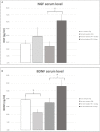Early nutritional intake influences the serum levels of nerve growth factor (NGF) and brain-derived neurotrophic factor in preterm newborns
- PMID: 36324384
- PMCID: PMC9620475
- DOI: 10.3389/fneur.2022.988101
Early nutritional intake influences the serum levels of nerve growth factor (NGF) and brain-derived neurotrophic factor in preterm newborns
Abstract
Introduction: Parenteral nutrition (PN) may have detrimental effects on neurodevelopment in preterm newborns. Moreover, enteral nutrition (EN) seems to be protective. To understand the mechanisms of how neurological development can be influenced by the route of administration of nutritional intake, we investigated the relationship between the serum levels of the nerve growth factor (NGF) and brain-derived neurotrophic factor (BDNF) and nutritional intake received in early life by preterm newborns.
Materials and methods: Specimens of blood were obtained at 28 days of life (DOL) for NGF/BDNF determination in neonates <32 weeks of gestation and/or with birth weight <1,500 g, consecutively observed in the neonatal intensive care unit. We analyzed the relation between amino acid content and energy intake and NGF/BDNF measurements at 28 DOL. PN protein intake was referred to as the total amounts of amino acid intake received daily.
Results: We enrolled 20 newborns (gestational age 30.45 ± 1.76 weeks, birth weight 1,340 ± 352.63 g). Serum NGF value at 28 DOL was positively correlated with enteral protein and energy intake (r = 0.767; r = 0.746, p < 0.001), whereas, negatively correlated with parenteral amino acid and energy intake (r = -0.652, p < 0.001; r = -0.466, p < 0.05). Similar significant correlations were described between BDNF level at 28 DOL and enteral energy intake (r = 0.493, p < 0.05). Multivariate regression analysis showed that NGF level at 28 DOL depends on enteral protein and energy intake administrated in the 1st week of life.
Conclusion: Neurotrophin values varied according to the route of nutrition administration in preterm newborns. NGF/BDNF serum levels are influenced positively and negatively by EN and PN, respectively.
Keywords: brain-derived neurotrophic factor (BDNF); enteral nutrition; nerve growth factor (NGF); parenteral nutrition; preterm neonates.
Copyright © 2022 De Nardo, Petrella, Di Chiara, Di Mario, Deli, Travaglia, Baldini, Russo, Parisi, Fiore and Terrin.
Conflict of interest statement
The authors declare that the research was conducted in the absence of any commercial or financial relationships that could be construed as a potential conflict of interest.
Figures



Similar articles
-
Early Enteral Feeding Restores Neurofilament Light Chain Serum Levels in Preterm Newborns.Curr Neuropharmacol. 2025;23(3):349-357. doi: 10.2174/1570159X23666240920165612. Curr Neuropharmacol. 2025. PMID: 39513312 Free PMC article.
-
Early Protein Intake Influences Neonatal Brain Measurements in Preterms: An Observational Study.Front Neurol. 2020 Aug 26;11:885. doi: 10.3389/fneur.2020.00885. eCollection 2020. Front Neurol. 2020. PMID: 32982918 Free PMC article.
-
Effects of early energy intake on neonatal cerebral growth of preterm newborn: an observational study.Sci Rep. 2021 Sep 16;11(1):18457. doi: 10.1038/s41598-021-98088-4. Sci Rep. 2021. PMID: 34531489 Free PMC article.
-
Practice of parenteral nutrition in VLBW and ELBW infants.World Rev Nutr Diet. 2014;110:177-89. doi: 10.1159/000358466. Epub 2014 Apr 11. World Rev Nutr Diet. 2014. PMID: 24751629 Review.
-
Energy needs: Neonatal parenteral nutrition: Evidence review C.London: National Institute for Health and Care Excellence (NICE); 2020 Feb. London: National Institute for Health and Care Excellence (NICE); 2020 Feb. PMID: 32282171 Free Books & Documents. Review.
Cited by
-
Influence of Lactation Stage on Content of Neurotrophic Factors, Leptin, and Insulin in Human Milk.Molecules. 2024 Oct 21;29(20):4973. doi: 10.3390/molecules29204973. Molecules. 2024. PMID: 39459341 Free PMC article.
-
Early Enteral Feeding Restores Neurofilament Light Chain Serum Levels in Preterm Newborns.Curr Neuropharmacol. 2025;23(3):349-357. doi: 10.2174/1570159X23666240920165612. Curr Neuropharmacol. 2025. PMID: 39513312 Free PMC article.
-
Quantitative Evaluation of White Matter Injury by Cranial Ultrasound to Detect the Effects of Parenteral Nutrition in Preterm Babies: An Observational Study.J Imaging. 2024 Sep 10;10(9):224. doi: 10.3390/jimaging10090224. J Imaging. 2024. PMID: 39330444 Free PMC article.
References
LinkOut - more resources
Full Text Sources
Research Materials

